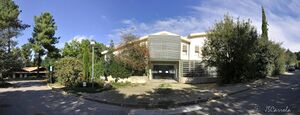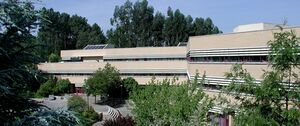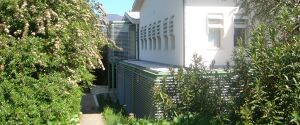Difference between revisions of "Portugal - Universidade de Trás-os-Montes e Alto Douro, Escola de Ciências Agrárias e Veterinárias"
| (18 intermediate revisions by 3 users not shown) | |||
| Line 1: | Line 1: | ||
| − | + | [[File:Veterinary Hospital (HVUTAD).jpg|thumb|Add caption here]] | |
| − | + | [[File:CA.jpg|thumb|Add caption here]] | |
| − | + | [[File:Department of Veterinary Science.jpg|thumb|Add caption here]] | |
| − | + | <br /> | |
| − | + | ==Introduction== <!----Write below this line---> | |
| − | + | The year 2010 was for the School of Agriculture and Veterinary Sciences (ECAV) one year of installation, organization and consolidation of the new structure within the University.<br /> | |
| − | + | Rounding up the regulations inherent in the full operation of the new school, set up and equipped to the premises of the Presidency Council for Scientific and Pedagogic Council, and conducted to the human resources required for the effective operation of the new structure. | |
| − | + | In 2010 ECAV prepared the processes of accreditation of courses in operation for submission to the agency and saw A3ES approved by that the two applications submitted in late 2009. It also developed and submitted a new proposal for the accreditation of the 3rd cycle of Veterinary Science.<br /> | |
| − | + | With the committed involvement of Directorates and Departments Course was held at different times and by different means for wide dissemination of the training offer ECAV.<br /> | |
| − | + | The number of students ECAV increased approximately 8% as a whole, with ECAV level of placements national 1st cycle and integrated Masters consolidated its position as the second choice in the majority of their courses in a context of increased competition and multiplicity of supply in all areas.<br /> | |
| + | The Department of Veterinary Sciences is housed in the School of Agriculture and Veterinary Sciences (ECAV) at the University of Tras os Montes and Alto Douro (UTAD) and its responsibilities teaching, research, community support and outreach in the area of Veterinary Science. | ||
| + | It is the Department responsible for the MSc in Veterinary Medicine (MIMV), the Master of Food Safety, the Doctor of Veterinary Science and also participates in teaching in Undergraduate and other Masters. Teaching Your body contains more than four dozen PhDs who are members of various research centers, including the CECAV (Center of Animal and Veterinary Sciences). The research focuses mainly in the areas of Clinical, Quality and Food Safety, Animal and Biomedical Sciences. Many research projects involve the Department in developing a partnership with several national and foreign institutions. Teachers also exert their activity in the Veterinary Hospital of the various aspects UTAD hospital, thus making community support and extension.<br /> | ||
<br /> | <br /> | ||
| + | ==History== <!----Write below this line---> | ||
| + | coming soon | ||
<br /> | <br /> | ||
| − | + | ==Education== <!----Write below this line---> | |
| + | '''MSc in Veterinary Medicine'''<br /> | ||
<br /> | <br /> | ||
Grade given: Master's Degree (MSc)<br /> | Grade given: Master's Degree (MSc)<br /> | ||
| − | + | Course Objectives:<br /> | |
In order to meet the expectations of students and the demands of society, for future professionals, the teaching of veterinary science covers a wide range of applications, cupcake comprising 11 semesters spread over two courses of studies and include:<br /> | In order to meet the expectations of students and the demands of society, for future professionals, the teaching of veterinary science covers a wide range of applications, cupcake comprising 11 semesters spread over two courses of studies and include:<br /> | ||
| − | + | - The clinical practice in companion animals, captive and exotic, diagnosing the etiology of disease processes and prescribe appropriate therapy and developing a prophylactic correctly. Another clinical activity focuses on species of zootechnical vocation and in recreation and sports, relevant not only in the farm economy, but also in public health.<br /> | |
| − | + | - The Public Health whose activity exceeds the intervention at the farm level, it translates into action remains to be a much more comprehensive, with particular emphasis on the control of zoonoses transmitted by several species, domestic animals, hunting and wildlife.<br /> | |
| − | + | - The Food Technology, the Sanitary Inspection in the field of Food Security allow the monitoring of product from production to consumption, ensuring quality health and food hygiene and the final product. These and many other related areas such as biotechnology and diagnostics, animal health and epidemiosurveillance are essential to the intervention of the Veterinarian.<br /> | |
<br /> | <br /> | ||
| − | + | '''Careers:'''<br /> | |
| − | + | - Biotechnology and Diagnostics<br /> | |
| − | + | - Clinic for pets<br /> | |
| − | + | - Clinical livestock species<br /> | |
| − | + | - Clinic of exotic and wild<br /> | |
| − | + | - Production and animal breeding<br /> | |
| − | + | - Animal health<br /> | |
| − | + | - Police and Sanitary epidemiosurveillance<br /> | |
| − | + | - Technology of products of animal origin<br /> | |
| − | + | - Sanitary Inspection<br /> | |
| − | + | - Hygiene and Public Health<br /> | |
<br /> | <br /> | ||
More at [http://www.utad.pt/vPT/Area2/estudar/oferta_educativa/1ciclo/Paginas/medicina_veterinaria_1ciclo.aspx?lst=1 Master's Degree in Veterinary Medicina]<br /> | More at [http://www.utad.pt/vPT/Area2/estudar/oferta_educativa/1ciclo/Paginas/medicina_veterinaria_1ciclo.aspx?lst=1 Master's Degree in Veterinary Medicina]<br /> | ||
| Line 37: | Line 42: | ||
<br /> | <br /> | ||
Grade given: Doctoral degree (PhD)<br /> | Grade given: Doctoral degree (PhD)<br /> | ||
| − | + | Course Objectives: <br /> | |
The third cycle of studies leading to the degree of Doctor of Veterinary Science has as main objective to form researchers, with a solid background, capable of producing knowledge by conducting original research, a prospective basic or applied in the different branches of Veterinary Science: Clinical , Quality and Food Safety, Animal and Biomedical Sciences.<br /> | The third cycle of studies leading to the degree of Doctor of Veterinary Science has as main objective to form researchers, with a solid background, capable of producing knowledge by conducting original research, a prospective basic or applied in the different branches of Veterinary Science: Clinical , Quality and Food Safety, Animal and Biomedical Sciences.<br /> | ||
| − | + | Duration: 6 semesters<br /> | |
| − | + | Number of credits (ECTS): 180<br /> | |
| − | + | Conditions of Access:<br /> | |
| − | + | • Master or legal equivalent of Veterinary Medicine, Medicine, Biomedical Engineering, Animal Science, Biology, Biotechnology for Health Sciences, Food Safety or equivalent areas;<br /> | |
| − | + | • Holders of the degree of Bachelor of Veterinary Medicine or Veterinary Science related areas to holders of an academic or scientific material that is recognized as attesting the capacity to carry out this cycle of studies by the Scientific Council ECAV, after consultation with the Steering Committee of the Course;<br /> | |
| − | + | • Holders of an academic, scientific or professional especially relevant that is recognized as attesting the capacity to carry out this cycle of studies<br /> | |
<br /> | <br /> | ||
More at [http://www.utad.pt/vPT/Area2/estudar/oferta_educativa/3ciclo/Paginas/ciencias_veterinarias_3ciclo.aspx?lst=1 PhD in Veterinary Sciences]<br /> | More at [http://www.utad.pt/vPT/Area2/estudar/oferta_educativa/3ciclo/Paginas/ciencias_veterinarias_3ciclo.aspx?lst=1 PhD in Veterinary Sciences]<br /> | ||
| − | + | ==Research== <!----Write below this line---> | |
| + | '''CECAV - Animal and Veterinary Research Centre'''<br /> | ||
CECAV is a research Centre that promotes research in animal production and veterinary sciences. New developments on animal production, industrial processing of animal products, animal health issues, as well as on the environmental impacts constitute the main research areas.<br /> | CECAV is a research Centre that promotes research in animal production and veterinary sciences. New developments on animal production, industrial processing of animal products, animal health issues, as well as on the environmental impacts constitute the main research areas.<br /> | ||
<br /> | <br /> | ||
| Line 57: | Line 63: | ||
More at [http://www.citab.utad.pt/centre.php CITAB]<br /> | More at [http://www.citab.utad.pt/centre.php CITAB]<br /> | ||
| − | + | ==Clinical== <!----Write below this line---> | |
| + | [[File:Veterinary Hospital (HVUTAD) Reception.jpg|thumb|Add caption here]] | ||
| + | The Veterinary Hospital of the University of Tras-os-Montes and Alto Douro (HVUTAD) was born in 1992, has recently been refurbished and was reopened and extended at May 8, 2009. Presents mission is to offer a support service to the community high quality, and support the teaching of the MSc in Veterinary Medicine, ensuring an adequate volume of clinical cases.<br /> | ||
The HVUTAD is structured into the following functional units: Companion Animal Clinic, Clinic and Wild and Exotic Animal Clinic of Farm Animal and Equine.<br /> | The HVUTAD is structured into the following functional units: Companion Animal Clinic, Clinic and Wild and Exotic Animal Clinic of Farm Animal and Equine.<br /> | ||
When dealing with a University Hospital, the animals will be attended by teams of teachers, veterinarians, veterinarians in training and postgraduate students in their final year of the MSc in Veterinary Medicine. The students never perform procedures without the direct supervision of clinical staff of HVUTAD.<br /> | When dealing with a University Hospital, the animals will be attended by teams of teachers, veterinarians, veterinarians in training and postgraduate students in their final year of the MSc in Veterinary Medicine. The students never perform procedures without the direct supervision of clinical staff of HVUTAD.<br /> | ||
| Line 67: | Line 75: | ||
See the official website: [http://www.utad.pt/vPT/Area2/OutrasUnidades/HospitalVeterinario/Paginas/hvutad-home.aspx Hospital Veterinário da UTAD]<br /> | See the official website: [http://www.utad.pt/vPT/Area2/OutrasUnidades/HospitalVeterinario/Paginas/hvutad-home.aspx Hospital Veterinário da UTAD]<br /> | ||
<br /> | <br /> | ||
| − | |||
| − | |||
| − | |||
| − | |||
| − | |||
| − | |||
| − | |||
| − | |||
| − | |||
| − | |||
| − | |||
| − | |||
| − | |||
| − | |||
| − | |||
| − | |||
| − | |||
| − | |||
| − | |||
| − | |||
| − | |||
| − | |||
| − | |||
| − | |||
| − | |||
| − | |||
| − | |||
| − | |||
| − | |||
| − | |||
| − | |||
| − | |||
| − | |||
| − | |||
| − | |||
| − | |||
| + | ==School name== <!----Write below this line---> | ||
| + | Escola de Ciências Agrárias e Veterinárias - Universidade de Trás-os-Montes e Alto Douro - UTAD | ||
| + | ==Established== <!----Write below this line---> | ||
| + | 1986 | ||
| + | ==Student Ambassadors== <!----Write below this line---> | ||
| + | '''2011/2012'''<br /> | ||
| + | [http://en.wikivet.net/User:TheZyain Paulo Jorge Pereira Afonso]<br /> | ||
| + | [http://en.wikivet.net/User:Lxrocha Leandro Xavier Resende Rocha]<br /> | ||
| − | == | + | ==Facebook page== <!----Write below this line---> |
| − | [http://www. | + | [http://www.facebook.com/pages/Hospital-Veterin%C3%A1rio-UTAD/248951858481672 UTAD Veterinary Hospital] |
| − | [http:// | + | ==Location== <!----Write below this line---> |
| − | + | [http://maps.google.pt/maps/place?q=Universidade+de+Tr%C3%A1s-os-Montes+e+Alto+Douro,+Vila+Real&hl=pt-PT&ie=UTF8&cid=5939551665559768024 Vila Real - Portugal] | |
| − | + | ==Direction Boards== <!----Write below this line---> | |
'''Veterinary Sciences Department''' <br /> | '''Veterinary Sciences Department''' <br /> | ||
| − | Director: | + | Director: Aura Antunes Colaço <br /> |
| − | Vice-Director: | + | Vice-Director: Maria João Miranda Pires <br /> |
<br /> | <br /> | ||
| − | ''' | + | '''MsC in Veterinary Medicine'''<br /> |
| − | Director: | + | Director: Felisbina Luisa Pereira Guedes Queiroga <br /> |
| − | Vice-Director: Maria | + | Vice-Director: Maria Madalena Vieira Pinto <br /> |
<br /> | <br /> | ||
'''PhD in Veterinary Sciences'''<br /> | '''PhD in Veterinary Sciences'''<br /> | ||
| Line 124: | Line 104: | ||
<br /> | <br /> | ||
'''Veterinary Hospital (HVUTAD)'''<br /> | '''Veterinary Hospital (HVUTAD)'''<br /> | ||
| − | Director: | + | Director: <br /> |
| − | == | + | ==Total number of Students== <!----Write below this line---> |
| − | < | ||
| − | |||
| − | |||
| − | |||
| − | |||
| − | |||
| − | |||
| − | |||
| − | |||
| − | |||
| − | |||
| − | |||
| − | + | ==Number of Undergraduates== <!----Write below this line---> | |
| − | == | + | ==Number of Postgraduates== <!----Write below this line---> |
| − | + | ==Website address== <!----Write below this line---> | |
| − | + | [http://www.utad.pt/vPT/Paginas/HomepageUtad.aspx Universidade de Trás-os-Montes e Alto Douro - UTAD]<br /> | |
| − | + | [http://www.utad.pt/vPT/Area2/Escolas/ECAV/Departamentos/cienciasveterinarias/Paginas/default.aspx Veterinary Sciences Department]<br /> | |
| − | + | [http://www.utad.pt/vPT/Area2/OutrasUnidades/HospitalVeterinario/Paginas/hvutad-home.aspx Veterinary Hospital (HVUTAD)]<br /> | |
| − | </ | ||
| − | |||
| − | + | ==Contact details== <!----Write below this line---> | |
| − | <!------- | + | '''Veterinary Sciences Department'''<br /> |
| − | | | + | email: secdpcv@utad.pt | Tel.: +351 259 350 634 | Fax: +351 259 350 480<br /> |
| − | + | Director's email: acolaco@utad.pt | Vice-Director's email: joamp@utad.pt <br /> | |
| − | |- | + | Adress: Departamento de Ciências Veterinárias – Edifício de Ciências Veterinárias – Quinta de Prados, Secretaria do Hospital Veterinário – Gabinete 1.6 - Ext. 2634 <br /> |
| − | + | '''MsC in Veterinary Medicine'''<br /> | |
| − | + | Director's email: fqueirog@utad.pt | Vice-Director's email: mmvpinto@utad.pt<br /> | |
| − | + | Adress: Departamento de Ciências Veterinárias, UTAD - Apartado 1013 - 5001-801 Vila Real<br /> | |
| − | + | '''PhD in Veterinary Sciences''' <br /> | |
| − | + | Director's email: acolaco@utad.pt | Vice-Director's email: alexe@utad.pt | Vowel's email: lcardoso@utad.pt <br /> | |
| − | + | Adress: Escola de Ciências Agrárias e Veterinárias, Dep. de Ciências Veterinárias, UTAD – Apartado 1013 – 5001-801 Vila Real<br /> | |
| − | + | '''Veterinary Hospital (HVUTAD)'''<br /> | |
| − | </ | ||
| − | |||
| − | |||
| − | |||
| − | |||
Revision as of 00:40, 25 July 2012
Introduction
The year 2010 was for the School of Agriculture and Veterinary Sciences (ECAV) one year of installation, organization and consolidation of the new structure within the University.
Rounding up the regulations inherent in the full operation of the new school, set up and equipped to the premises of the Presidency Council for Scientific and Pedagogic Council, and conducted to the human resources required for the effective operation of the new structure.
In 2010 ECAV prepared the processes of accreditation of courses in operation for submission to the agency and saw A3ES approved by that the two applications submitted in late 2009. It also developed and submitted a new proposal for the accreditation of the 3rd cycle of Veterinary Science.
With the committed involvement of Directorates and Departments Course was held at different times and by different means for wide dissemination of the training offer ECAV.
The number of students ECAV increased approximately 8% as a whole, with ECAV level of placements national 1st cycle and integrated Masters consolidated its position as the second choice in the majority of their courses in a context of increased competition and multiplicity of supply in all areas.
The Department of Veterinary Sciences is housed in the School of Agriculture and Veterinary Sciences (ECAV) at the University of Tras os Montes and Alto Douro (UTAD) and its responsibilities teaching, research, community support and outreach in the area of Veterinary Science.
It is the Department responsible for the MSc in Veterinary Medicine (MIMV), the Master of Food Safety, the Doctor of Veterinary Science and also participates in teaching in Undergraduate and other Masters. Teaching Your body contains more than four dozen PhDs who are members of various research centers, including the CECAV (Center of Animal and Veterinary Sciences). The research focuses mainly in the areas of Clinical, Quality and Food Safety, Animal and Biomedical Sciences. Many research projects involve the Department in developing a partnership with several national and foreign institutions. Teachers also exert their activity in the Veterinary Hospital of the various aspects UTAD hospital, thus making community support and extension.
History
coming soon
Education
MSc in Veterinary Medicine
Grade given: Master's Degree (MSc)
Course Objectives:
In order to meet the expectations of students and the demands of society, for future professionals, the teaching of veterinary science covers a wide range of applications, cupcake comprising 11 semesters spread over two courses of studies and include:
- The clinical practice in companion animals, captive and exotic, diagnosing the etiology of disease processes and prescribe appropriate therapy and developing a prophylactic correctly. Another clinical activity focuses on species of zootechnical vocation and in recreation and sports, relevant not only in the farm economy, but also in public health.
- The Public Health whose activity exceeds the intervention at the farm level, it translates into action remains to be a much more comprehensive, with particular emphasis on the control of zoonoses transmitted by several species, domestic animals, hunting and wildlife.
- The Food Technology, the Sanitary Inspection in the field of Food Security allow the monitoring of product from production to consumption, ensuring quality health and food hygiene and the final product. These and many other related areas such as biotechnology and diagnostics, animal health and epidemiosurveillance are essential to the intervention of the Veterinarian.
Careers:
- Biotechnology and Diagnostics
- Clinic for pets
- Clinical livestock species
- Clinic of exotic and wild
- Production and animal breeding
- Animal health
- Police and Sanitary epidemiosurveillance
- Technology of products of animal origin
- Sanitary Inspection
- Hygiene and Public Health
More at Master's Degree in Veterinary Medicina
PhD in Veterinary Science
Grade given: Doctoral degree (PhD)
Course Objectives:
The third cycle of studies leading to the degree of Doctor of Veterinary Science has as main objective to form researchers, with a solid background, capable of producing knowledge by conducting original research, a prospective basic or applied in the different branches of Veterinary Science: Clinical , Quality and Food Safety, Animal and Biomedical Sciences.
Duration: 6 semesters
Number of credits (ECTS): 180
Conditions of Access:
• Master or legal equivalent of Veterinary Medicine, Medicine, Biomedical Engineering, Animal Science, Biology, Biotechnology for Health Sciences, Food Safety or equivalent areas;
• Holders of the degree of Bachelor of Veterinary Medicine or Veterinary Science related areas to holders of an academic or scientific material that is recognized as attesting the capacity to carry out this cycle of studies by the Scientific Council ECAV, after consultation with the Steering Committee of the Course;
• Holders of an academic, scientific or professional especially relevant that is recognized as attesting the capacity to carry out this cycle of studies
More at PhD in Veterinary Sciences
Research
CECAV - Animal and Veterinary Research Centre
CECAV is a research Centre that promotes research in animal production and veterinary sciences. New developments on animal production, industrial processing of animal products, animal health issues, as well as on the environmental impacts constitute the main research areas.
More at CECAV
CITAB - Centre for the Research and Technology of Agro-Environmental and Bilogical Sciences
This Unit was a result of a merging process, later in 2007, between 3 existing Units at the University of-Trás-os-Montes e Alto Douro (Centro de Estudos Tecnológicos, do Ambiente e da Vida (CETAV), Centro de Ciência e Engenharia Agrícola (CECEA) and Centro de Estudos em Gestão de Ecossistemas (CEGE) in which the selection of the members was done by high quality criteria of productivity. Following the policy of attracting members out of UTAD, at present we count active members and collaborators from other national and international institutions and Units. After the evaluation by FCT by the Panel of Agricultural Sciences the Unit was classified as "VERY GOOD" at the end of 2008.
More at CITAB
Clinical
The Veterinary Hospital of the University of Tras-os-Montes and Alto Douro (HVUTAD) was born in 1992, has recently been refurbished and was reopened and extended at May 8, 2009. Presents mission is to offer a support service to the community high quality, and support the teaching of the MSc in Veterinary Medicine, ensuring an adequate volume of clinical cases.
The HVUTAD is structured into the following functional units: Companion Animal Clinic, Clinic and Wild and Exotic Animal Clinic of Farm Animal and Equine.
When dealing with a University Hospital, the animals will be attended by teams of teachers, veterinarians, veterinarians in training and postgraduate students in their final year of the MSc in Veterinary Medicine. The students never perform procedures without the direct supervision of clinical staff of HVUTAD.
The HVUTAD is structured in different areas depending on the species. These areas or services are comprised of veterinarians who devote most of his professional activity corresponding to the species or species:
Area of Companion Animals
Area of Farm Animal and Equine
Area Exotic and Wild Animals
See the official website: Hospital Veterinário da UTAD
School name
Escola de Ciências Agrárias e Veterinárias - Universidade de Trás-os-Montes e Alto Douro - UTAD
Established
1986
Student Ambassadors
2011/2012
Paulo Jorge Pereira Afonso
Leandro Xavier Resende Rocha
Facebook page
Location
Direction Boards
Veterinary Sciences Department
Director: Aura Antunes Colaço
Vice-Director: Maria João Miranda Pires
MsC in Veterinary Medicine
Director: Felisbina Luisa Pereira Guedes Queiroga
Vice-Director: Maria Madalena Vieira Pinto
PhD in Veterinary Sciences
Director: Aura Antunes Colaço
Vice-Director: Alexandra Sofia Miguens Fidalgo Esteves
Vowell: Luis Miguel Martins Lucas Cardoso
Veterinary Hospital (HVUTAD)
Director:
Total number of Students
Number of Undergraduates
Number of Postgraduates
Website address
Universidade de Trás-os-Montes e Alto Douro - UTAD
Veterinary Sciences Department
Veterinary Hospital (HVUTAD)
Contact details
Veterinary Sciences Department
email: secdpcv@utad.pt | Tel.: +351 259 350 634 | Fax: +351 259 350 480
Director's email: acolaco@utad.pt | Vice-Director's email: joamp@utad.pt
Adress: Departamento de Ciências Veterinárias – Edifício de Ciências Veterinárias – Quinta de Prados, Secretaria do Hospital Veterinário – Gabinete 1.6 - Ext. 2634
MsC in Veterinary Medicine
Director's email: fqueirog@utad.pt | Vice-Director's email: mmvpinto@utad.pt
Adress: Departamento de Ciências Veterinárias, UTAD - Apartado 1013 - 5001-801 Vila Real
PhD in Veterinary Sciences
Director's email: acolaco@utad.pt | Vice-Director's email: alexe@utad.pt | Vowel's email: lcardoso@utad.pt
Adress: Escola de Ciências Agrárias e Veterinárias, Dep. de Ciências Veterinárias, UTAD – Apartado 1013 – 5001-801 Vila Real
Veterinary Hospital (HVUTAD)



